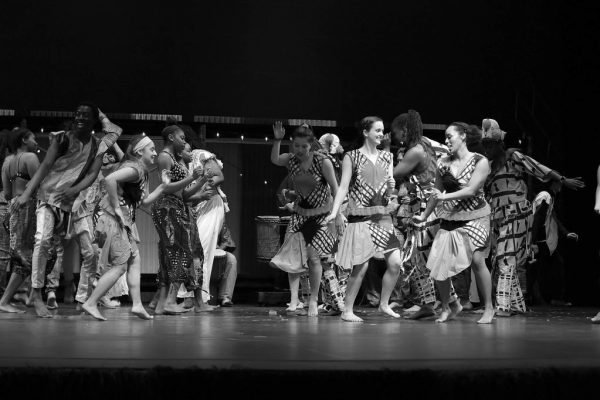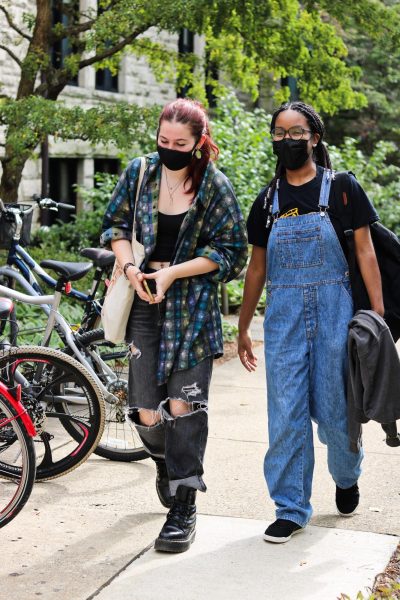Discourse, Disagreement Central to Truly Liberal Thought
Two weekends ago, I took a short trip to Cincinnati to visit my grandmother. While driving through the rural farmlands and small towns of suburban Ohio, I came to the realization that I, a person born and raised in Seattle, was studying at a college with sensibilities that effectively mirrored that of my hometown and that these farmlands and small towns were far more reflective of Ohio than anything I would witness in Oberlin. Oberlin, the isolated, liberal bubble in the middle of Ohio, is not a good representation of the larger community itself.
One of the main reasons I chose to attend Oberlin was its distance from my home state. Although I knew that Oberlin had a fairly large liberal demographic, I made the assumption that the farther I was from my home, the more politically diverse my community would be. And yet somehow, I ended up right back in Seattle.
But is Oberlin truly a liberal space? I believe so. Liberalism has a funny way of preaching inclusion but remaining extraordinarily exclusionary to other categories of political thought. I do believe the Oberlin community could benefit from an opening of minds and a broadening of theoretical political horizons. I am not suggesting that Oberlin needs to start accepting more conservative students, nor am I promoting conservatism on campus. I am merely suggesting that Oberlin offer more opportunities for students to broaden their intellectual horizons through offering a large range of lectures, dialogues, and courses. It is my opinion that in order to be a true liberal, one must understand other families of political thought on a deep level.
Oberlin College was founded as a Christian college, but its political origins are distinctly liberal. It was the first American institute of higher learning to make racial colorblindness a written aspect of College policy, and thus was the first to admit Black students in 1835. It was also the first college to offer bachelor’s degree programs to women beginning in 1837. Since then, Oberlin has prided itself on its diversity, equity, and inclusion programs, social justice-oriented campus life, and commitment to environmental justice.
However, with the recent intensification of political discourse, particularly its rapid diffusion on social media, the very definitions of and ways of practicing liberalism have been changing. Today, it’s common to read a short blurb or graphic on social media and repost it, contributing to a phenomenon known as “social media activism.” It’s an opportunity for information to become easily accessible and widely dispersed but also a way for people to become complacent with inequality under the guise of reposting and sharing media.
This contemporary form of liberalism is especially prevalent for young people, and I’ve noticed this at Oberlin. Students feel more comfortable regurgitating information they’ve already heard than critically analyzing social issues and forming their own opinions. While this isn’t necessarily an issue, and rather a form of privilege, it does become a problem when people claim to be “activists” or “allies.” Activism and allyship involve much more than reiterating information. They involve active engagement, critical thought, and sacrifice.
While I believe Oberlin does provide opportunities for students to understand forms of non-liberal political thought to a certain degree, there’s still work to be done. At the start of the year, I remember being told that making mistakes was a part of Oberlin culture. It’s important to take risks and be unafraid to say things that may be “incorrect,” because making mistakes is an integral part of learning. However, since orientation, I have yet to see a single person “make a mistake” in class, during casual conversations, or online. And while this could be chalked up to first-year nervousness about participating in class, I also think the rigidity of liberal values at this school, along with the intense pressure that students may feel to conform to the majority, may discourage students from speaking candidly and without fear of making a mistake.
I’ll be the first to admit that, like most people, I take a sort of subconscious comfort in knowing that everyone around me shares my values. Yet I know that this structure is not conducive to a functioning and ultimately progressive society. The competition of different political ideologies is what inspires our democratic process — the basis for our country’s political system. It’s important that we not only amplify all voices but also work to critically analyze and understand other perspectives.
While I have spent most of my life in Seattle, I’ve also spent a lot of time among both conservative Americans and Indians in my family. Though it’s difficult to have conversations about politics with people who have completely opposite views as you, I have learned to find merit in open, respectful dialogue. Understanding where other people are coming from, what motivates their political beliefs, and what they like or dislike about conservatism, liberalism, and other groups of thought can be eye-opening.
Typically, liberals want to remain in liberal spaces, and conservatives want to remain in conservative spaces. It’s an innate human inclination to be with people who are similar and like-minded. However, closing yourself off to new people means closing yourself off to a host of experiences. Higher education is an opportunity to not only meet new people but also gain the tools for understanding and engaging with advanced political thought. My advice is not necessarily to move to a conservative area or forcefully seek out conversations and interactions with conservatives. I am merely suggesting that research and critical thinking can go a long way. It can rip you from the binds of homogeneous liberal theory and force you to be your own person with your own values.




